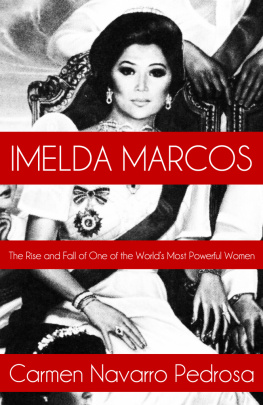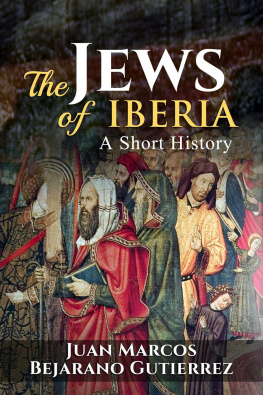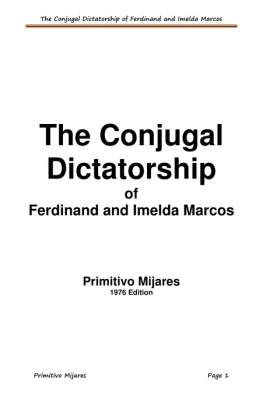reads like a show biz biography which, given the nature of Philippine politics, is perhaps appropriate.
The New York Review of Books.
just as a Voltaire plot, the story of Imelda and her family is rife with intrigue and absurdity.
The Houston Chronicle
a glimpse into the psyche of the woman the Philippines dubbed the steel butterfly the backwater queen who defrauded a nation.
Savvy
To all my countrymen
who suffered under
Marcoss martial law
PROLOGUE
The Chink in the Image
I N THE EARLY MORNING of December 30, 1965, a few hundred Filipinos milled around the suburban residence of President-elect Ferdinand E. Marcos. They came in all manner of transport, from distant and nearby provinces, attracted by publicity on the celebrated beauty of the First Lady-to-be, Imelda Romualdez Marcos. She was, newspapers said, as beautiful as an actress and had once held the title of Miss Manila. The spectators were mostly humble Filipinos who had sacrificed an hours sleep to be ahead of the thousands who would be in historic Luneta for the inaugural rites. They perched on trees and scaled the concrete wall to get a good view of the courtyard where Marcos and Imelda were to make an appearance.
So determined were they on this immediate task that it would have been futile to persuade them to give some thought to the virtues of the man they had elected to be their President for the next four years. The spectators of that morning were archetypal common folk, with a reputation for lethargy in the most trying social and economic circumstances. They seemed doomed by fate not to care beyond what was immediate and to hand. That day they had come to see Imelda. This was the good show they preferred to remonstrations that there were other things more politically significant than the reputed beauty of a First Lady. This preoccupation by the masses with what is trite and shallow seemed their quintessential tragedy.
The curtains were about to be raised on a drama in which the beautiful Imelda, whom they had traveled miles to see, would play a stellar role. They had assumed the role of spectators, unaware that the plot of the story about to begin would be played out at their expense. When the end came, alas... the early birds would have much to regret about that seemingly innocent morning. But this is going years ahead. The task then was to secure the best vantage point to see the proceedings in the courtyard, which was partially shielded by the profuse foliage of an acacia tree.
Members of the Marcos and Romualdez families and their friends were gathered around an improvised altar decorated with white gladiolas. A German priest, Father Albert Gansewinkle, was saying mass exclusively for the family before the official rites. It was said that Imelda, mindful of tradition and family ties, chose him for the occasion. He was the former rector of the Divine Word University in Leyte, where Imelda had been a student and where her father was once the dean of law. The priest had been summoned from faraway Bonn for this auspicious morning. But a more significant historical touch was the choice of music to be played. This, too, Imelda had specially requested. It was Plegaria (A Plea), a song composed by Norberto Romualdez, her paternal uncle and the first Romualdez to achieve national fame. Though its music reached out to all, only Imelda and some members of the Romualdez clan understood its meaning.
After the mass Marcos went over his inaugural speech with a press aide while Imelda returned to her dressing room for a final touch-up. There was still no view for the public outside.
It was ten-fifteen, five hours after the first comers had perched on the trees beyond the walls, when Imelda and the three Marcos children, followed by the President-elect, emerged from the iron grille gates. The bodyguards skirmished with the eager crowds as they pushed to get a better view. Imelda paused and waved before she entered the car.
There have been many descriptions of Imelda from both those who have seen her and those who have not. There are also those who described her beauty before and after she became Mrs. Marcos. Their descriptions have been printed in countless magazines and newspapers both in the Philippines and abroad... the flawless complexion, long jet-black hair, the finely chiseled features that combined the best of her mixed ancestry, and a queenly bearing. These, coming from the very best sources, fell short of capturing Imeldas appearance that day in 1965 when she became First Lady of the Land. Imelda was radiantly and stunningly beautiful that morning.
For the inaugural rites she wore a plain sheath of embroidered pia, a silky Philippine fabric, and a fine veil over her head that she lifted when she faced the cheering crowd. A deceptively simple but expensive string of pearls framed her delicate face, which was barely touched by makeup. The glow of triumph shone through.
At the Luneta grandstand dignitaries and representatives from thirty-five countries, government officials, and Manilas elite stood in attendance as the Marcoses made their way to their respective seats. In the crowd were United States Vice-President Hubert Humphrey, Prime Minister Chung Il-kwon of Korea, Foreign Minister Thanat Khoman of Thailand, and Prime Minister Kishi Nobusuke of Japan.
Mr. Humphreys presence underlined the importance of the Philippines to the United States. Although most Westerners have only a vague romantic image of this group of islands of some 115,000 square miles in the Pacific, the country is the site of the two largest military bases outside the United States. As such it is strategically important to the Western world. But more importantly, it holds the key to understanding America, for the Philippines, as it were, is the skeleton in its closet, the country that holds the distinction of being the only formal colony that freedom-loving America has ever had. From the time that Admiral Dewev docked his warship at Manila Bay in 1898, and Americans took over the Philippines in 1899, millions of dollars have been poured by American entrepreneurs into these islands for the odd profit.
But the mercenary aspect had long been clouded by rationalization and evangelical zeal. Like the Spaniards before them, the Americans claimed they came to the Philippines to save poor Filipinos. The trouble was they never asked whether Filipinos wanted to be saved. One-tenth of the entire Filipino population died, in what American historian Gore Vidal described as the first genocide in modern history before Hitler, resisting such altruism.
The conquest of the Philippines was Americas maiden imperialist adventure in the Pacific, and all major political events in that country thereafter spring from that fact. Yet through the years the memories of that brutal war have been repressed, reined in by declarations of special friendship, plenty of aid, and good deeds until it came to pass that some Americans believed that the granting of independence to the Philippines was an act of kindness and generosity to Filipinos rather than one of self-respect and self-preservation.
This distortion is at the bottom of Americas ambivalent policy and attitudes toward the people of these islands. America has not quite come to terms with the fact that sometime in the past it had committed a grave mistake by using brute force to deprive a people of a victory that was rightfully theirs. But more tragically, when the mistake had been realized, it refused or was unable to cut and cut cleanly, to paraphrase a Republican senator apropos the end of the Marcos regime. Most Americans, and especially those who were in a position to alter the course of history, had allowed themselves to be deluded by their own subterfuges in holding on to the Philippines, belaboring the many good deeds they had done for the sake of the Philippines, forgetting perhaps that it was not goodness that Filipinos desired but their freedom and the opportunity to shape their own destiny.












